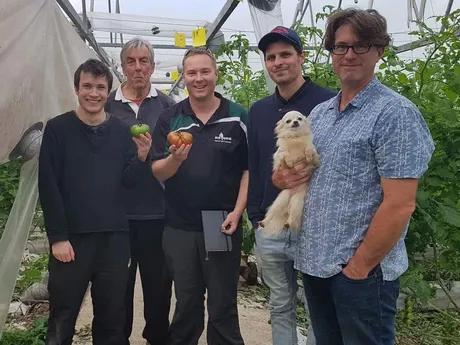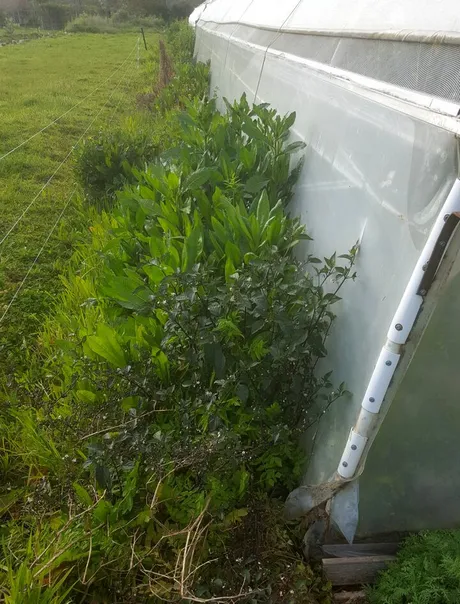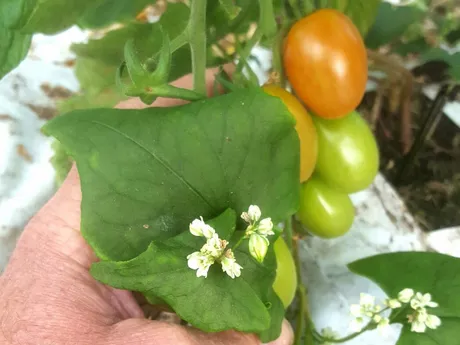A small New Zealand produce farm, is making some exciting progress with an agroecology project that will reduce the need for chemicals on tomato farms.
The Curious Croppers mainly produce tomatoes on a small scale but are working on a project that they have dubbed the NZ Agroecology Initiative.

Anthony Tringham and his wife Angela have been allowing weeds to grow wild in order to enhance the ecological complexity of the greenhouse and its surrounding environment.
"A lot of the stuff that we are doing, is taking leap of faith," Angela said. "A lot of the big growers, like the really big growers, they cannot just do a leap of faith. We are a small grower with no shareholders or directors. Anthony and I can just sit down and have a glass of wine together and ask each other should we do this? And if everything dies, that is just our problem. The corporates need to be more conservative. That means we can test ideas, and we want to have fun with it."
The family live in Clevedon, South Auckland in a 150-year-old farmhouse. As they do not grow in the soil, they cannot be certified organic, but the aim of the Curious Croppers is to use the absolute minimum amount of chemicals, and grow lots of weeds that are specifically targeted to introduce certain predators.
"What that means is we don't have to weed anything," Anthony said. “In the 'old days when we got taught about Integrated pest management (IPM), it was more like a slash and burn IPM where you tried to have everything dead outside, or just low-cut grass. Then when a pest problem arose you would introduce a specific creature to keep it under control. But the thinking wasn’t too different from using a chemical control to sort out your problem. With our agroecology project we are evolving a more complex and nuanced eco-management system. And on our farm, we are taking hunches and putting the science behind it."

Anthony, who is also on the board for Tomatoes NZ, says that with levy funding, the organisation has employed a PHD student to scope out all the existing creatures that are suspected to be beneficial. The next step is to figure out how to enhance their effectiveness. Initial results are looking encouraging. In the mean-time in Clevedon, the Tringhams have had their best year ever for insect control.
"This was the year that we let the whole farm go wild, and there were tall weeds growing up to the edge of our greenhouses," he explained. "So, it is a slapdash, let's try lots of things and see what works approach. Last year the place looked wild, but our insecticide applications were minimal. We had zero whitefly problems and only TPP towards the end. We also found that we were getting native bio-controls.”
Therefore, the family is now working on how to suppress TPP numbers using natural controls.
"As an example, we are very interested in Solanum nigrum now. A lot of people hate this weed because it is a super prolific seeder and is fairly herbicide resistant. It also drives pea processors nutty because the black berries can get picked up in the harvester. However, we suspect it is a good host plant for a tiny type of mite predator, Amblyseius Limonicus. It would be very interesting if the gardener’s most hated weed turned out to be the ultimate companion plant."

Some of the other principles they are using, according to Anthony, are inspired from other industries; grapes for example, have a problem with Light Brown Apple Moth.
"There is a predator for this insect, but it needs to be encouraged by planting flowering plants rich in nectar," Anthony said. "Specifically, Buckwheat, Phacelia and Alyssum. The nectar from these plants keeps the beneficial insects alive for much longer than if the orchards were just in grass, and this whole of environment solution rather elegantly solves the moth problem."
Anthony says that it is important to do this research now, to get "to where you need to be, before you need to be there", as insecticides may one day be phased out completely. And to this end, he is very excited with how things are progressing.
He adds that it also helps that there are no market gardens or greenhouses nearby or they would have to deal with the overflow of their pest insects.
For more information
Angela or Anthony Tringham
The Curious Croppers
Phone: +64 27 292 8735
[email protected]
www.facebook.com/pg/curiouscroppers
